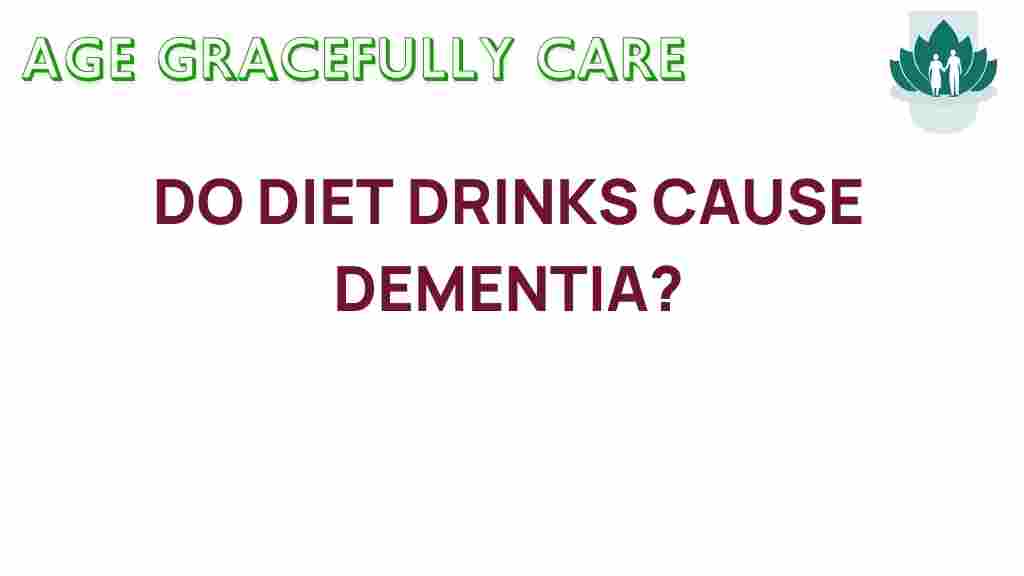Do Diet Drinks Really Contribute to Dementia Risk?
As concerns over health and nutrition grow, many people are turning to diet drinks as a low-calorie alternative to traditional sugary beverages. However, emerging studies have raised questions about the potential health risks associated with these beverages, particularly their link to dementia. In this article, we will explore the relationship between diet drinks and dementia risk, examining the role of artificial sweeteners, cognitive decline, and brain health.
The Rise of Diet Drinks
Diet drinks, often marketed as healthier alternatives to regular sodas, use artificial sweeteners to provide sweetness without the calories. Common sweeteners include aspartame, sucralose, and saccharin. While these beverages can help with weight management, their long-term effects on health are now under scrutiny.
The Link Between Diet Drinks and Dementia
Recent studies suggest that regular consumption of diet drinks may be associated with an increased risk of dementia and cognitive decline. A notable study published in the journal *Alzheimer’s & Dementia* found that individuals who consumed one or more diet drinks per day had a significantly higher risk of developing dementia compared to those who did not. Here are some key findings:
- Cognitive Decline: The study indicated that diet drink consumers experienced faster cognitive decline over time.
- Stroke Risk: Another study suggested that diet drink consumption could be linked to an increased risk of stroke, which is a known risk factor for dementia.
- Brain Health: Research indicates that artificial sweeteners might negatively affect brain health, potentially leading to neurodegenerative diseases.
Understanding Artificial Sweeteners
Artificial sweeteners are used in diet drinks to mimic the sweetness of sugar. However, their safety and long-term health effects remain controversial. Some studies have suggested that these sweeteners may disrupt gut bacteria and lead to metabolic changes that could increase the risk of chronic diseases, including those that affect brain health.
The Mechanism Behind Cognitive Decline
The exact mechanism by which diet drinks may contribute to cognitive decline is still being researched, but several hypotheses have been proposed:
- Inflammation: Some artificial sweeteners may promote inflammation in the body, which is known to have a detrimental effect on brain health.
- Insulin Resistance: Regular consumption of sweeteners could lead to insulin resistance, a condition associated with an increased risk of Alzheimer’s disease.
- Neurotransmitter Disruption: Certain sweeteners might interfere with neurotransmitter functions, impacting mood and cognition.
Given the potential health risks associated with diet drinks, it is essential to make informed beverage choices. Here are some tips to help you navigate your options:
- Limit Diet Drinks: Consider reducing your intake of diet drinks, especially if you consume them daily.
- Explore Natural Alternatives: Opt for beverages sweetened with natural sweeteners, such as honey or stevia, or choose unsweetened drinks.
- Stay Hydrated: Water should be your primary beverage choice. Herbal teas and infusions can also be good alternatives.
- Read Labels: Be vigilant about reading labels to avoid hidden artificial sweeteners in other products.
Current Studies on Diet Drinks and Dementia
Numerous studies have examined the relationship between diet drinks and dementia risk. Here are some significant findings:
- Framingham Heart Study: This long-term study found that participants who consumed diet sodas were more likely to develop dementia and experience cognitive decline.
- The Health and Aging Brain Study: Researchers observed that diet soda drinkers had a higher incidence of stroke and dementia over time.
- Meta-analysis Findings: A comprehensive review of multiple studies concluded that there is a concerning association between diet drink consumption and cognitive decline.
Understanding Health Risks Beyond Dementia
While the link between diet drinks and dementia is alarming, there are other health risks associated with consuming these beverages:
- Obesity: Ironically, some studies suggest that artificial sweeteners may lead to increased cravings for sweet foods, potentially contributing to weight gain.
- Metabolic Syndrome: Regular consumption of diet drinks could be linked to metabolic syndrome, a cluster of conditions that increase the risk of heart disease and diabetes.
- Dental Health: Many diet drinks are acidic, which can erode tooth enamel, causing dental problems over time.
Nutrition and Brain Health
Maintaining brain health requires a comprehensive approach to nutrition. Here are some dietary choices that support cognitive function:
- Omega-3 Fatty Acids: Found in fish like salmon and flaxseeds, omega-3s are essential for brain health.
- Antioxidant-Rich Foods: Berries, nuts, and dark chocolate are rich in antioxidants that may protect brain cells.
- Whole Grains: Foods like oats and quinoa provide essential nutrients and energy for the brain.
- Leafy Greens: Vegetables like spinach and kale are packed with vitamins and minerals that support cognitive function.
Troubleshooting Tips for Reducing Diet Drink Consumption
If you are looking to cut back on diet drinks but find it challenging, consider these tips:
- Gradual Reduction: Slowly reduce your intake rather than eliminating it all at once to avoid cravings.
- Find Alternatives: Experiment with flavored water, herbal teas, or naturally flavored sparkling water.
- Stay Busy: Sometimes cravings stem from boredom. Engage in activities that keep your mind occupied.
The Bottom Line
The potential link between diet drinks and dementia risk raises significant concerns about the long-term health effects of artificial sweeteners. While these beverages may offer a low-calorie alternative, the risks may outweigh the benefits. Opting for healthier beverage choices and maintaining a balanced diet rich in nutrients is crucial for overall brain health.
As studies continue to explore this connection, staying informed about the impact of your dietary choices is essential. For more information on nutrition and health, visit this resource. Always consult with healthcare professionals when making significant changes to your diet.
In conclusion, while diet drinks may seem like a convenient choice for those looking to manage their weight, the potential risks to brain health and overall well-being warrant caution. Making informed beverage choices can lead to a healthier lifestyle and better cognitive function.
This article is in the category Health and created by AgeGracefullyCare Team
